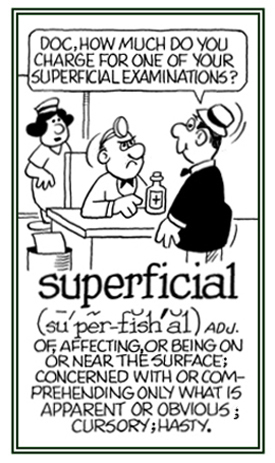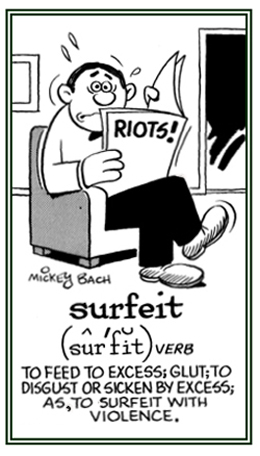fac-, facil-, fact-, feas-, -feat, -fect, -feit, -facient, -faction, -fic-, -fy, -ficate, -fication
(Latin: to make, to do, to build, to cause, to produce; forming, shaping)
Suffixes are also defined as groups of letters placed at the end of words to modify their meanings or to change them for different grammatical functions; for example, from adjectives to adverbs, etc.
2. Something added to the end of of something else: The suffix of the evening meal at June's birthday party was the singing of "Happy birthday" by the guests.2. To include or to attach something to the end of another item: After asking his mother if he could go to the movie with his girlfriend, he made sure to suffix his request with, "please".
Fortunately Henry only had a superficial wound during the car accident.
2. Concerned with or comprehending only what is apparent or obvious; shallow: Jane told Sam that she was not interested in having a superficial relationship.3. Apparent rather than actual or substantial: Despite the superficial resemblance, the two paintings at the exhibition were by two different artists.
Shirley had a superficial resemblance to her sister.
4. Trivial; insignificant: The editor made only a few superficial changes in the text of the reporter's article.5. Etymology: "of or relating to a surface" from Latin superficialis, "of or pertaining to the surface"; from superficies, "surface"; from super, "above, over" + facies, "form, face"; meaning "not deep" or "thorough" as to perceptions, thoughts, etc.

Go to this Word A Day Revisited Index
so you can see more of Mickey Bach's cartoons.
2. Overindulgence, or a bout of overindulgence, in something, especially food or drink.
3. Disgust or revulsion resulting from overindulgence.
4. Etymology: from Old French surfet, "excess"; noun use of surfaire "to overdo"; from sur-, "over" + faire, "to do"; from Latin facere, "to make".
The issue of immigrants, who are trying to leave their various geographical areas and are surfeiting into European countries in hopes of refuge, has become a serious problem!
2. Etymology: from Old French surfet, "excess"; from Latin surfaire "to overdo"; from sur-, "over" + faire, "to do" which is from Latin facere, "to make".The sense of "eat or drink to excess, overfeed", is first recorded in Middle English in 1422.
The figurative sense of "fill or supply to excess" is first recorded in 1592.


Go to this Word A Day Revisited Index
so you can see more of Mickey Bach's cartoons.
2. Informal: Causing awe or amazement; extraordinarily great or intense.
3. Extremely good; wonderful: "We had a terrific vacation."
4. Etymology: from Latin terrificus, "causing terror or fear", from terrere, "fill with fear" plus root of facere, "to make".
Weakened sensed of "very great, severe"; such as, "I have a terrific headache" appeared in 1809. The colloquial sense of "excellent" began about 1888.


